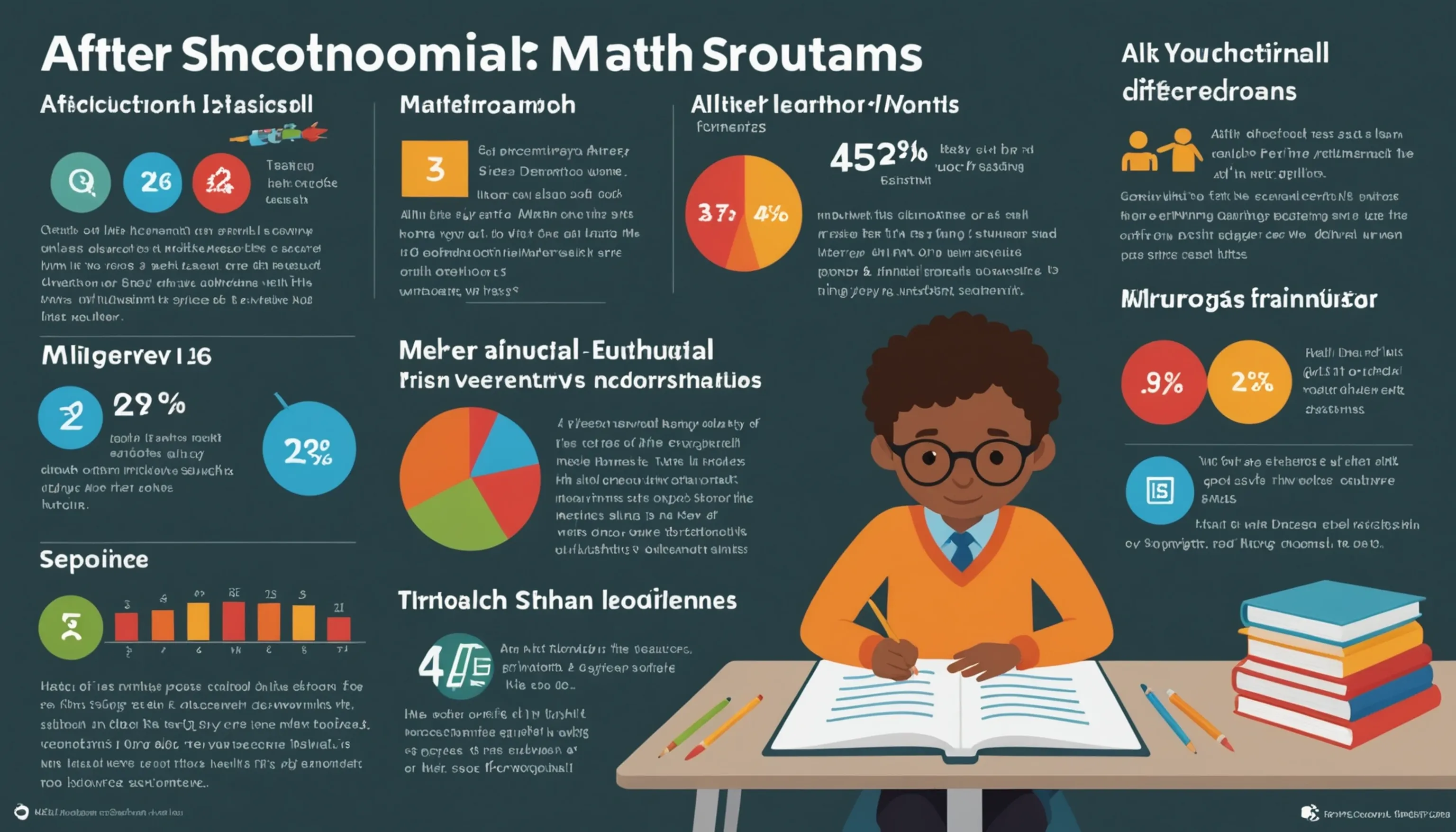After School Math Programs
 HvWHenry van Wagenberg
HvWHenry van Wagenberg
Importance of After School Math Programs
After school math programs play a crucial role in enhancing a teenager's understanding and appreciation of mathematics. These programs provide a structured environment where students can receive additional support outside of regular classroom hours. With the increasing complexity of math curricula, many teenagers struggle to keep up, making these programs essential.
They offer personalized attention from instructors, allowing students to ask questions and work at their own pace. Furthermore, after school math programs encourage collaboration among peers, fostering a sense of community and motivation. Ultimately, they help build confidence and equip teenagers with the skills necessary for academic success.
Benefits of After School Math for Teenagers
After school math programs offer numerous benefits that significantly impact teenagers' academic performance and overall development. Firstly, these programs provide personalized instruction, allowing students to receive help tailored to their specific needs. This individualized attention helps to bridge the gap between classroom learning and comprehension.
Moreover, after school math sessions foster a supportive environment where students can ask questions without the pressure of their peers. This setting encourages them to tackle challenging concepts, leading to a deeper understanding of the subject matter. Additionally, students often develop stronger problem-solving skills as they engage in various mathematical challenges during these programs.
Another key benefit is the improvement in academic performance. Research shows that students who participate in after school math programs often see an increase in their grades and standardized test scores. This boost in confidence can motivate teenagers to pursue higher-level math courses, setting a solid foundation for future academic and career opportunities.
Furthermore, these programs help in building essential life skills, such as time management and teamwork. As students work together on math problems, they learn to communicate effectively and collaborate with their peers, which are vital skills in both academic and professional settings. Overall, after school math programs are an invaluable resource that can lead to lasting positive outcomes for teenagers.

How After School Math Helps Improve Grades
After school math programs are designed to provide students with the extra support they need to enhance their understanding of mathematical concepts, ultimately leading to improved grades. One of the primary ways these programs help is by offering additional practice. Many students struggle with math because they don’t get enough opportunities to apply what they learn in the classroom. After school programs provide a structured environment where they can practice problem-solving skills, reinforcing their classroom learning.
Furthermore, these programs often employ qualified instructors who can identify each student's unique learning style. This personalized attention allows educators to tailor their teaching methods to fit individual needs, ensuring that students grasp challenging concepts more effectively. By addressing specific areas of difficulty, students can overcome obstacles that might otherwise hinder their academic progress.
Additionally, after school math programs create a sense of accountability. When students commit to attending these sessions regularly, they are more likely to stay engaged with their studies and keep up with assignments. This consistent exposure to math concepts helps solidify their understanding and prepares them for upcoming tests.
Moreover, as students see improvements in their grades, their confidence grows. This boost in self-esteem encourages them to participate more actively in class, further enhancing their learning experience. Overall, after school math programs play a pivotal role in helping students improve their grades and develop a positive attitude toward mathematics.
Finding the Right After School Math Program
Finding the right after school math program for your teenager can significantly impact their learning experience. Start by considering the student's needs; assess their strengths and weaknesses in math. Research local programs and check for qualifications of the instructors. Look for programs that offer personalized instruction and a supportive environment.
Additionally, consider the program's schedule and location to ensure it fits into your family's routine. Reading reviews and seeking recommendations from other parents can also provide valuable insights. Ultimately, the right program should inspire confidence and foster a love for math.

Types of After School Math Programs Available
There are various types of after school math programs available to cater to the diverse needs of teenagers. Understanding these options can help parents choose the best fit for their child.
Tutoring programs are among the most common types. These typically involve one-on-one sessions with a qualified tutor who focuses on specific areas where the student may be struggling. This personalized approach can be incredibly effective in addressing individual learning gaps.
Group classes offer a more collaborative environment. In these settings, students work together on math problems, allowing them to learn from one another and develop teamwork skills. Group classes often cover a range of topics, making them ideal for students who wish to strengthen their overall math skills.
Online math programs have gained popularity due to their flexibility. Many online platforms offer interactive lessons, video tutorials, and practice exercises that students can complete at their own pace. This option is particularly beneficial for those with busy schedules.
Enrichment programs focus on advanced math concepts, catering to students who excel in math and want to challenge themselves further. These programs often introduce topics like calculus, statistics, or even coding.
Finally, some schools offer homework help sessions as part of their after school programs. These sessions allow students to receive assistance with math homework and reinforce concepts learned during the day. By exploring these various types of after school math programs, parents can find the perfect fit for their teenager’s needs.
How to Evaluate After School Math Programs
Evaluating after school math programs is crucial to ensure your teenager receives the support they need for academic success. Start by considering the program’s curriculum. Look for programs that align with your child’s school curriculum or provide enrichment opportunities to challenge advanced students. A well-structured curriculum will help reinforce classroom learning and foster a deeper understanding of math concepts.
Next, assess the qualifications of the instructors. Experienced and knowledgeable teachers can make a significant difference in your child's learning experience. Inquire about their backgrounds, teaching methods, and ability to connect with students. A positive rapport between students and instructors can enhance motivation and engagement.
Additionally, consider the program's class size. Smaller class sizes often allow for more individualized attention, enabling instructors to address each student’s unique needs. Programs with a low student-to-teacher ratio can lead to better learning outcomes.
Another factor to evaluate is the program’s structure and schedule. Ensure it fits within your family’s routine and offers enough flexibility for your teenager. Some programs may offer drop-in sessions, while others require a commitment for a specific duration.
Finally, gather feedback from other parents and students. Reviews and testimonials can provide valuable insights into the program's effectiveness. You may also want to observe a session, if possible, to see how students interact and learn in that environment. By carefully evaluating these factors, you can select an after school math program that best supports your teenager’s educational journey.
Supporting Your Teen's Math Learning at Home
Supporting your teenager's math learning at home is essential for their success. Start by creating a designated study space free from distractions, where they can focus on their math homework. Encourage them to practice regularly, using resources like online math games or apps that make learning fun.
Additionally, be available to help with challenging concepts, but encourage independence by guiding them to find solutions on their own. Communicate with their teachers to stay informed about their progress and areas needing improvement. Lastly, celebrate their achievements, no matter how small, to boost their confidence and motivation.
Tips for Parents to Help with Math Homework
Helping your teenager with math homework can sometimes be challenging, but with the right approach, you can make the process more effective and enjoyable. Here are some practical tips for parents to support their teens in math:
1. Create a Positive Environment: Ensure your teenager has a quiet, well-lit space dedicated to studying. A clutter-free area helps minimize distractions and fosters focus.
2. Encourage a Growth Mindset: Remind your teen that making mistakes is a natural part of learning. Encourage them to view challenges as opportunities for growth rather than obstacles.
3. Be Patient: If your teen struggles with a concept, be patient and avoid showing frustration. Instead, take a step back and help them break down the problem into smaller, manageable parts.
4. Use Resources: Utilize online resources, such as educational websites or videos, to provide additional explanations or examples. Sometimes, a different perspective can make a significant difference in understanding.
5. Practice Together: Engage in math problems together. This collaborative approach not only reinforces learning but also helps you understand their thought process. Ask guiding questions to encourage critical thinking.
6. Communicate with Teachers: Stay connected with your teen's math teacher to gain insights into their progress and any specific areas where they may need extra help.
By implementing these tips, parents can create a supportive atmosphere that encourages their teenagers to excel in math and develop a positive attitude toward the subject.
Resources for Additional Math Practice
Providing your teenager with additional resources for math practice can significantly enhance their understanding and skills. Here’s a list of valuable resources that can help:
- Online Learning Platforms: Websites like Khan Academy, IXL, and Mathway offer interactive lessons and practice problems tailored to various levels of math.
- Math Apps: Download apps such as Photomath, Prodigy, or Mathway on smartphones or tablets. These apps provide instant feedback and can make learning engaging.
- YouTube Channels: Channels like Math Antics and PatrickJMT offer video tutorials that explain complex concepts in a simple and relatable manner.
Additionally, consider the following options for practice:
- Workbooks: Purchase grade-appropriate workbooks from educational stores or online retailers. These books often include step-by-step explanations and practice exercises.
- Tutoring Services: If your teenager needs more personalized attention, consider hiring a tutor who can provide tailored instruction and practice.
- Math Games: Engage your teen with fun math games available online or as board games. Games like Math Dice and Sum Swamp make learning enjoyable.
Finally, encourage your teenager to participate in math competitions or clubs at school. These activities provide additional challenges and foster a love for mathematics. By exploring these resources, parents can help their teens gain confidence and improve their math skills effectively.
